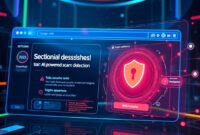Is your password strong enough to protect your digital identity? In today’s world, choosing a strong password is key. It keeps your personal info, money, and online accounts safe. Weak passwords, like “12345” or your name, are easy for hackers to guess.
But don’t worry – you can make passwords that are easy to remember but hard to crack. This guide will show you How to Choose a Password.
We’ll cover the basics of password security and what to avoid. You’ll learn how to make and manage strong passwords. By the end, you’ll know how to keep your online world safe and secure.
Understanding Password Security Fundamentals
Strong passwords are key to good cybersecurity. They protect our important info and keep our online accounts safe. Yet, many people don’t see how crucial password security is. This makes them open to many password threats.
Why Strong Passwords Matter
Using a mix of letters, numbers, and symbols in a password makes it safer. Experts say a password should be at least 12 characters long. This makes it tough for hackers to guess or crack your password.
Common Password Vulnerabilities
- Many people reuse passwords, which is risky. It lets hackers into many accounts with just one wrong guess.
- Simple, guessable passwords, like personal info or common words, are easy targets for hackers.
The Cost of Weak Password Protection
Weak passwords lead to data breaches, which are a big worry. They let hackers into our personal info and accounts. In 2023, the average cost of a data breach was $4.45 million. This shows how important strong passwords are to avoid big financial losses.
| Metric | Value |
|---|---|
| Average Data Breach Cost in 2023 | $4.45 million |
| Recommended Password Length | At least 12 characters |
| Importance of Password Diversity | Mix of upper and lowercase letters, numbers, and symbols |
Weak passwords can cause a lot of trouble. They can lead to identity theft, financial loss, and the loss of personal data. The cost of weak passwords is high, affecting both time and money, and can also harm our reputation.
“Cybersecurity is not just about technology; it’s about people, processes, and practices. Strong password security is a fundamental part of this equation.” – Cybersecurity expert, John Doe
How to Choose a Password: Essential Guidelines
Making a secure password is key in today’s digital world. Cyber threats are everywhere. It’s vital to know the basics of creating a strong password.
Experts say your password should be at least 16 characters long. Longer passwords are harder for hackers to guess. Also, try to make your password random and not use personal info or common words.
- Use a mix of uppercase and lowercase letters, numbers, and symbols to enhance the complexity of your password.
- Avoid reusing passwords across multiple accounts, as this increases the risk of credential stuffing attacks if one of your accounts is compromised.
- Consider using a passphrase, a sequence of unrelated words that are easy to remember but difficult for attackers to guess.
Never share your passwords with anyone, not even IT or support. Keeping your login details safe is your job. You should be the only one who knows them.
| Characteristic | Recommendation |
|---|---|
| Length | At least 16 characters |
| Composition | Mix of uppercase, lowercase, numbers, and symbols |
| Uniqueness | Unique for each account, no personal information or common words |
| Sharing | Never share your passwords with anyone |
By following these tips, you can make your online accounts much safer. This helps keep your personal info safe from hackers.
The Three Pillars of Password Strength
There are three main things that make a password strong: password length, character diversity, and uniqueness. By focusing on these, you can make passwords that hackers can’t crack.
Length Requirements
Length is key in password strength. Experts say passwords should be at least 16 characters long. A 14-character password could take a desktop computer centuries to crack.
Character Diversity
Character diversity is also important. Your password should have a mix of letters, numbers, and special characters. This makes it hard for hackers to guess. The National Institute of Standards and Technology (NIST) says to make passwords as complex as you can remember.
Uniqueness Factor
Lastly, using unique passwords for each account is crucial. This stops a breach in one account from affecting others. NIST suggests using random, unique passwords for every login.
By using passwords that are long, diverse, and unique, you can protect your online accounts well. This is vital in today’s world, where data breaches and identity theft are common.
Creating Memorable Yet Secure Passphrases
Passphrases are a big step up in password security. They are longer and more complex, making them both strong and easy to remember. You can use a favorite song lyric, quote, or a mix of the first letters of a memorable phrase. This way, your passwords are not just secure but also easy to recall.
It’s best to make your passphrase at least 15 characters long. Mix in uppercase and lowercase letters, numbers, and special characters. For instance, “Bread & butter YUM!” is stronger than “breadandbutteryum.” You can also use the first letter of each word in a memorable quote, adding numbers and symbols. For example, “4Th3L1onSleeps!”.
Passphrases are a great way to keep your accounts safe without making it hard to remember. By using these tips, you can make sure your passwords are both secure and easy to remember.
| Password Security Recommendation | Guideline |
|---|---|
| Minimum Password Length | At least 10 characters |
| Character Types | Numbers, symbols, capital and lower-case letters |
| Passphrase Examples | “Bread & butter YUM!”, “4Th3L1onSleeps!” |
| Passphrase Technique | Use the first letter of each word in a memorable quote |
| Password Security Tips | 7 |
| Two-Factor Authentication Layers | 3 (Something you know, have, and are) |
Learning these techniques and best practices will help you create strong, memorable passphrases. This way, your online accounts will be well-protected without being hard to remember.
Password Management Tools and Their Benefits
Keeping your online accounts safe is key today. Password managers, password vaults, and password security tools are heroes in this fight. They protect your sensitive info and make logging in easier.
Popular Password Manager Options
There are many trusted password management tools out there. Names like 1Password, Bitwarden, KeePass, Keeper, Password Safe, and Dashlane are well-known. They use strong encryption, like AES 256-bit, to keep your passwords safe.
Features to Look For
- Strong encryption algorithms to protect your password vault
- Cross-platform compatibility, ensuring seamless access across devices
- Multi-factor authentication (MFA) for an extra layer of security
- Password generator to create strong, unique credentials
- Automatic password synchronization across devices
- Secure sharing and collaboration features for team environments
- Backup and export options to safeguard your password data
Implementation Strategies
Adding a password manager to your digital life can boost your security. Start by picking a reliable provider that fits your needs. Use a strong master password to unlock your vault. Then, add your accounts one by one.
Features like password autofill and multi-factor authentication make logging in easier. This way, you protect your sensitive info while making your life online more convenient.
Using password management tools helps you control your online security. Say goodbye to the hassle of remembering many passwords. Enjoy the convenience and peace of mind these tools offer. Keep your digital world safe with confidence.
What to Avoid When Creating Passwords
Creating a strong password is key to keeping your online accounts safe. Many people make mistakes when picking passwords, which can put their security at risk. Let’s look at what to avoid to keep your info secure.
- Avoid short passwords. Passwords should be at least 16 characters long to protect against cracking programs.
- Steer clear of single words or phrases. Good passwords mix uppercase and lowercase letters, numbers, and special characters.
- Don’t use personal information. Stay away from names, birthdays, addresses, or other easy-to-find details in your passwords.
- Refrain from password reuse. Using the same password for many accounts risks all of them if one is hacked.
- Abstain from common substitutions. Swapping letters for similar symbols, like “@” for “a,” is not secure.
- Sidestep keyboard patterns and sequential numbers. Passwords like “qwerty” or “123456” are simple to guess and often used.
- Avoid including your username in the password. This makes it simpler for hackers to guess your password.
By avoiding these common password errors, you can greatly improve your online account security. A strong, unique password is your best defense against unauthorized access.

Multi-Factor Authentication: Adding Extra Security
In today’s digital world, keeping your online accounts safe is more than just a strong password. Multi-factor authentication (MFA) is a key extra security step. It helps protect your personal info from hackers. With MFA, you need two or more ways to prove who you are, making it harder for hackers to get in, even if they guess your password.
Types of MFA
The main types of MFA are:
- Something you know (like a password or PIN)
- Something you have (like a phone, token, or security key)
- Something you are (like a fingerprint or facial scan)
Using these different ways to verify your identity makes it much harder for hackers to get into your account. They would need to get multiple pieces of information to succeed.
Setting Up MFA on Different Platforms
Many online services, like email, social media, and banks, offer MFA. To turn it on, you usually go to your account settings. There, you pick a second factor, like a mobile app, SMS, or security key.
About 66% of Google Account users have turned on 2-Step Verification for extra security. Devices signed into Google can also get easier login prompts, making codes less necessary.
Security keys are also a good choice to stop phishing attacks. More people are using them for better online safety. Also, 40% of users prefer verification code apps like Google Authenticator when they can’t get mobile service or face connectivity problems.
By using MFA, you make your online accounts much safer. It helps fight off cyber threats. Check out the MFA options on the sites you use and turn it on today.
Real-World Password Security Breaches
Strong passwords are crucial, as shown by real security breaches and hacking incidents. These cases warn us about the dangers of weak passwords.
In 2022, there were 1,802 security breaches, affecting 422 million people. This was a 41% jump from the year before. The 2018 Facebook breach is a prime example, exposing 50 million users’ data due to internal flaws.
Weak passwords can lead to big problems. Experts say passwords under eight characters are too easy to guess. They recommend using 12 to 16 characters for better security.
Using passphrases, which mix random words, is seen as a safer option. Yet, many struggle to change their passwords after a breach. They often use the same weak passwords on other accounts.
Multifactor authentication (MFA) adds an extra layer of security. But, attacks like password spraying and brute force continue to challenge even the best password protection.
These examples stress the need for strong password security and educating users. By being proactive in cybersecurity, we can protect ourselves from password hacking and breaches.
| Incident | Impact | Lessons Learned |
|---|---|---|
| Facebook Data Breach (2018) | 50 million user accounts compromised | Importance of robust internal security measures and software integrity |
| Password Spraying Attacks | Targeted multiple accounts with few passwords | Need for strong, unique passwords and multi-factor authentication |
| Brute Force Attacks | Time-consuming but effective against weak passwords | Importance of password complexity and length requirements |
| Credential Stuffing | Unauthorized access using stolen account credentials | Avoiding password reuse and implementing robust account security measures |

“The only way to guarantee that a password will not be compromised is to not use it at all.”
Best Practices for Password Storage
Keeping your passwords safe is key to protecting your digital life. With new tech coming out, it’s important to know the latest ways to store passwords. Focus on digital solutions and backup plans.
Digital Storage Solutions
A good password manager is a top choice for digital storage. These tools keep your passwords safe and make new, strong ones for each account. LastPass, 1Password, and Bitwarden are great options, offering strong security and extra login steps.
Backup Strategies
Having a backup plan for your passwords is also crucial. Think about using a second password manager or a secure, encrypted file. Some people even write down their passwords and keep them in a safe place. Always check and update your passwords to keep them safe.
By following these tips, you can make your online accounts much safer. This helps protect your important info from hackers.
| Hashing Algorithm | Recommended Configuration |
|---|---|
| Argon2id | Minimum: 19 MiB memory, 2 iterations, 1 parallelism |
| bcrypt | Minimum: Work factor of 10 or more, 72-byte password limit |
| PBKDF2 | Minimum: 600,000 work factor, HMAC-SHA-256 internal hash |
| scrypt | Minimum: (2^17) CPU/memory cost, 8 block size, 1 parallelization |
Choosing the right hashing algorithm and its settings is important for password safety. Each algorithm has specific settings to balance security and speed.
Good password storage is vital for keeping your apps and users’ data safe. By following these tips and keeping up with security updates, you can lower the risk of data breaches. This makes your digital world safer for everyone.
Conclusion
In today’s digital world, keeping your online safety is key. This means making strong, unique passwords and keeping them safe. Learning about password security and using tools to manage them can protect your personal and work accounts.
A good password is long, with letters, numbers, and symbols. It should not include personal info or common words. Passphrases, made of several words, are even safer. Also, a password manager can keep your login details safe, lowering the chance of your accounts being hacked.
Always follow the latest security tips. Use multi-factor authentication when you can. And don’t forget to update your passwords often to outsmart hackers. Your password is your first defense online, so protect it well.




